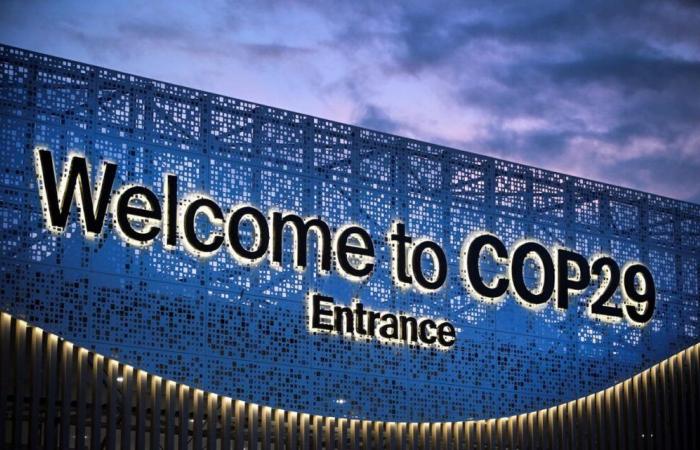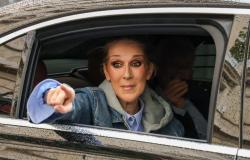COP29 –
Poor countries resign themselves to disappointing financial deal
Nearly 200 countries approved a financial agreement for developing countries on Sunday at COP29 in Azerbaijan.
AFP
Published: 11/23/2024, 11:43 p.m. Updated 8 hours ago
The COP 29 building, in Baku, Azerbaijan, November 10, 2024.
AFP
Subscribe now and enjoy the audio playback feature.
BotTalk
300 billion dollars per year, in ten years: developed countries committed on Saturday in Baku to more financing poor countries threatened by climate change, at the end of a chaotic UN conference in Azerbaijan including the developing world leaves furious.
The representative of the 45 poorest countries on the planet denounced an “unambitious” agreement. “The amount proposed is pitifully low. It’s ridiculous,” denounced Indian delegate Chandni Raina, criticizing the Azerbaijani presidency of COP29.
This financial commitment from European countries, the United States, Canada, Australia, Japan and New Zealand, under the auspices of the UN, is to increase from 100 billion today to “at less than $300 billion annually by 2035 in their loans and donations to developing countries.
A period of budgetary tightening and political upheaval
Money to adapt to floods, heatwaves and droughts. But also to invest in low-carbon energies instead of developing their economies by burning coal and oil, as Western countries have done for more than a century.
The Europeans, the world’s leading donors of climate finance, were not ready to go beyond this amount, in a period of budgetary tightening and political upheaval. But believe they have contributed to a historic result.
“COP29 will go down in history as the start of a new era for climate finance,” said Commissioner Wopke Hoekstra.
“I had hoped for a more ambitious result”
US President Joe Biden welcomed an “important step” in the fight against global warming, and pledged that America would continue its action despite the climate skeptic attitude of his successor, Donald Trump. “If some seek to deny or delay the clean energy revolution that is underway in America and around the world, no one can undo it – no one,” Joe Biden said.
From France’s point of view, the text is “disappointing” and “not up to the challenges”, underlined the French Minister of Ecological Transition Agnès Pannier-Runacher. She regretted “an absence of leadership from the Azerbaijani presidency”.
UN Secretary-General Antonio Guterres expressed mixed feelings about the agreement, urging states to view it as a “foundation” to consolidate. “I had hoped for a more ambitious outcome – both financially and in terms of mitigation – to address the great challenge we face,” he said in a statement, calling on “governments to consider this agreement as a foundation – to continue building.”
But the COP29 agreement, sealed during the second night of extension, leaves a bitter taste for many participants. The poorest countries on the planet and the island states of the Pacific, Caribbean or Africa asked for double or more. And he was adopted at almost 3:00 a.m. after exhausting negotiations.
“No country got everything it wanted”
“No country got everything it wanted, and we leave Baku with a mountain of work to do. “So now is not the time to take victory laps,” said UN climate chief Simon Stiell.
The head of the African group’s negotiators, Ali Mohamed, regretted a financial commitment that was “too weak” and “too late”. “The commitment to mobilize increased financing by 2035 is too little, too late and too ambiguous in its implementation,” he said. “We leave Baku knowing that we have made progress in some areas, but what we have achieved is far from what we hoped for.”
Azerbaijan fought to win the organization of the conference, the largest international event organized by the country, against Armenia. But the declarations of its president against France, the arrests of environmental activists and the harassment of American parliamentarians in Baku have weighed down the atmosphere.
“Painful experience”
His management of the negotiations is harshly judged. Germany criticized it for its proximity to oil-producing countries, and the poorest states on the planet slammed the door on a meeting on Saturday, believing they had not been fully consulted.
Baku was a “painful experience,” said Brazilian Environment Minister Marina Silva, who will host the next COP in a year.
The unprecedented background of this 29th COP is a year 2024 which will probably be the hottest ever measured. And, nine years after the Paris agreement, humanity will still burn more oil, gas and coal than last year.
An explicit mention for “transition fuels”
In two weeks of meetings in Azerbaijan, storms have killed Philippines in Honduras, Spain is licking its wounds after deadly floods, Ecuador has declared a national emergency because of drought and fires….
But, in what is interpreted as a revenge of last year’s COP28 in Dubai, no explicit mention is made in the Baku agreement of the transition away from fossil fuels. In contrast, “transition fuels,” the gas industry term for natural gas, are entitled to explicit mention.
The Europeans, who were hoping for more ambition in reducing greenhouse gas emissions, will also not find in the text the creation of a system for annual monitoring of transition efforts away from fossil fuels (coal, oil, gas) that they were hoping for.
“Latest news”
Want to stay on top of the news? “24 Heures” offers you two appointments per day, directly in your email box. So you don’t miss anything that’s happening in your Canton, in Switzerland or around the world.
Other newsletters
Log in
Did you find an error? Please report it to us.
13 comments






